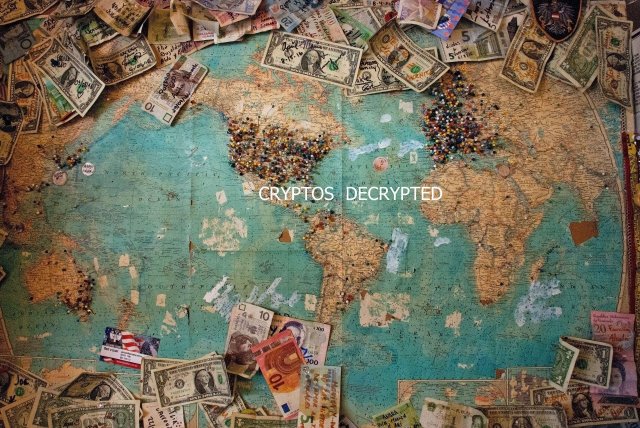
Please click the link below to listen to the 68th episode of my weekly crypto podcast ‘Two Minute Crypto.’ These are intended to be short, single-topic ramblings on some aspect of the cryptosphere. Consider dropping a like and or a review on iTunes or Podbean if you enjoy the podcast. Comments and critiques welcome.
External Podcast Links
https://anchor.fm/the-two-minute-crypto-podcast
Transcript
Key Concepts 13 - What is DeFi?
This series is aimed at providing crypto enthusiasts with a go-to source to outline ideas that are essential to engaging with the crypto landscape. Hopefully, each episode should be understandable by any reasonably open-minded individual with little or no prior knowledge of the subject matter. In paring things down to the bone many generalizations will be made. As a long-time member of the crypto community, you may find some of the descriptive language employed far too broad or too loosely applied. However, the goal of this series is to open the door to engagement where the real process of learning and understanding can begin.
Welcome to Two Minute Crypto. This week continues the Key Concept Series with a brief examination of DeFi. If you have been following crypto in recent months you have likely encountered the term with some frequency. Along with IEOs, it was the buzz word of 2019. Unlike IEOs, the DeFi sector has so far been a success.
DeFi stands for Decentralized Finance. At its most basic, it is the offer of blockchain-based financial services without the required approval of a middleman such as a bank. At the moment, many high-profile DeFi projects such as Maker Dao exist on Ethereum though other chains also facilitate such services. The entire industry is at a very early stage but once again it worth noting that the core function is to offer access to financial services without the approval of a central authority.
These services come in two basic flavours – loans and interest. Loans involve ‘locking’ up crypto assets as collateral and in return receiving fiat. Essentially, a crypto-secured loan. The terms and conditions of this loan are governed by a smart contract though the implementation of this varies by provider. The level of collateralization ranges considerably from 150% to over 300% depending on the crypto and the project offering the service. There is no approval process – if you possess the asset and are willing to lock it up then a loan can be secured. Interest is paid on the loan and as long as the value of the crypto held as security doesn’t drop below a certain agreed level the loan may continue through time. It can be paid off at any time though, of course, terms and conditions vary by provider.
On the other side of the coin, you have interest payments where a deposit of crypto yields a return. Bitcoin tends to offer the highest yield but Ethereum and other high cap projects often offer attractive returns. Once again, the funds are locked away with varying terms and conditions for regaining access to them. The service providers are in turn loaning out (or rehypothecating) this crypto for preferential returns. Generally, smart contracts govern these services, so no centralized permission is required to open and close such interest-paying accounts.
Critically, on both sides of the ledger, you are still exposed to risk. While permission to borrow or lend is not required – the service is offered by a centralized third party. Maker Dao is something of an exception in this regard as it is entirely governed by smart contract agreement – limiting exposure to a third party. However, in the interests of reflecting the reality of the broader market; DeFi is best understood as private entities offering a service built on top of a blockchain. Once you engage their services, they take control of the designated crypto at which point you become fully exposed to third party risk. Should the firm go broke, become embroiled in legal trouble or be hacked your funds may be lost.
Other aspects of DeFi involve crypto credit card services such as those offered by Crypto.com. These cards generally require you to deposit or stake a certain amount of a designated crypto in order to access the features of a particular card – these features vary but tend to revolve around rebates on purchases. These cards can be obtained without credit history checks or bank permission so long as certain staking criteria are met but they are at a very early stage of development and market penetration.
More esoteric applications of Decentralized Finance such as derivatives, insurance, and prediction markets are also of importance but beyond the scope of this introduction to DeFi.
Thanks for listening.
Resources
What is DeFi? Understanding The Decentralized Finance Landscape
https://blockonomi.com/what-is-decentralized-finance-defi/
The Definitive Guide to DeFi (Decentralized Finance)
https://exodus.io/blog/what-is-defi/
Decentralised Finance: Complete DeFi Overview & Outlook
https://youtu.be/Vq1bxcoW1jQ
Last Week's Episode

